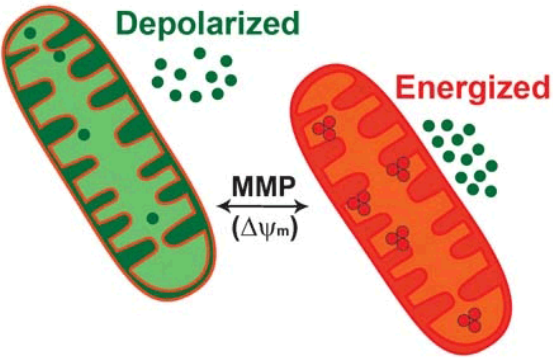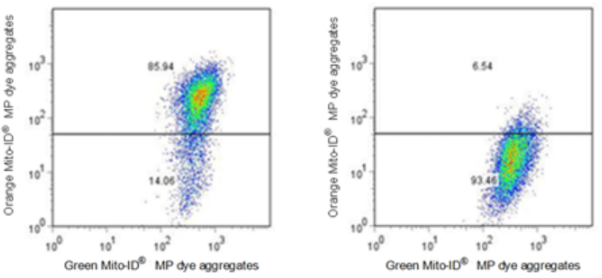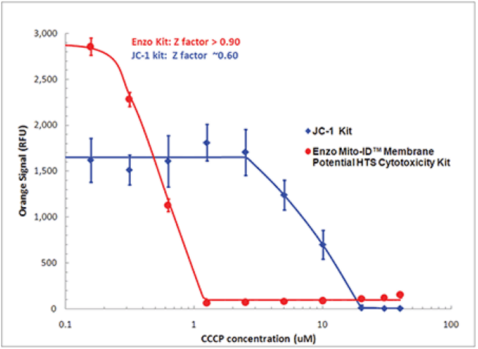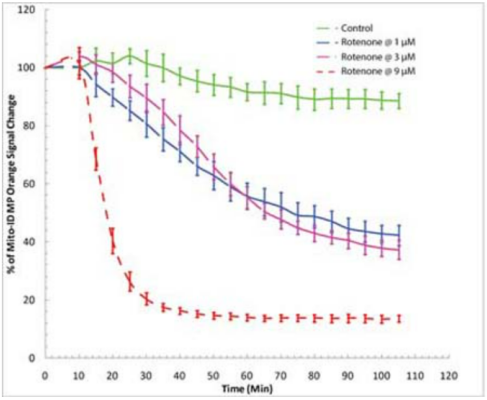線粒體膜電位(Mitochondrial Membrane Potential,MMP)是判定細(xì)胞健康程度�����、線粒體膜通透性和細(xì)胞凋亡的一個重要指標(biāo)����,MMP的喪失通常與細(xì)胞凋亡的早期階段有關(guān)��。評估線粒體功能狀態(tài)的基于細(xì)胞的檢測方法正在成為闡明線粒體活動在藥物誘導(dǎo)毒性��、細(xì)胞凋亡級聯(lián)以及其他細(xì)胞和生化過程中的作用的有用工具���。
Enzo Life Sciences的MITO-ID??Membrane potential detection kit包含一種雙發(fā)射陽離子染料��,用于檢測活細(xì)胞中的線粒體膜電位(MMP)����。在有能量或活躍的細(xì)胞中�,MITO-ID??膜電位試劑因其相對負(fù)電荷而在線粒體中迅速聚集成發(fā)橙色熒光的聚合體,而在細(xì)胞質(zhì)中則以發(fā)綠色熒光的單體存在����。然而,在MMP受損的細(xì)胞中,MITO-ID?膜電位試劑主要以綠色熒光單體存在于整個細(xì)胞質(zhì)中��,在線粒體中不再表現(xiàn)出橙色熒光�。
?
作用機(jī)制
該染料的基本化學(xué)結(jié)構(gòu)由高度共軛的部分組成,使正電荷廣泛離域�。該染料能夠選擇性地進(jìn)入線粒體,當(dāng)膜電位增加時���,它的顏色會從綠色可逆地變?yōu)槌壬p發(fā)射電位探針)����。這種光物理特性是由于在膜極化時可逆地形成J-聚集體��,導(dǎo)致在490nm處激發(fā)時���,發(fā)射光從~530nm轉(zhuǎn)移到590nm。因此�����,具有低膜電位的線粒體將積累低濃度的染料�,并表現(xiàn)出綠色熒光,而更高極化的線粒體將表現(xiàn)出橙色的熒光��。
?

?MITO-ID??Membrane potential detection kit線粒體膜電位檢測試劑盒
?
產(chǎn)品特點
●?耐光雙發(fā)射染料,能夠根據(jù)線粒體膜電位狀態(tài)發(fā)出綠色或橙色熒光
●?比JC-1熒光染料靈敏10倍�����,并具有卓越的水溶性
●?無需洗滌步驟
●?適用于化學(xué)/環(huán)境毒性篩選
●?適用于高通量應(yīng)用
?
實驗示例

圖1.?用MITO-ID??Membrane Potential reagent對HeLa細(xì)胞的線粒體進(jìn)行染色����,并通過熒光顯微鏡進(jìn)行觀察。橙色熒光聚集體定位于線粒體(橙色通道)��,而綠色熒光單體主要定位于細(xì)胞質(zhì)(FITC通道)����。
?

圖2. 對照組和實驗組細(xì)胞的流式細(xì)胞儀分析。未經(jīng)處理的Jurkat細(xì)胞(左)與用1μM CCCP處理15分鐘的Juekat細(xì)胞(右)��,用MITO-ID??Membrane Potential reagent對細(xì)胞進(jìn)行染色���,并使用流式細(xì)胞儀檢測�����。
?
產(chǎn)品信息
產(chǎn)品貨號 | ENZ-51018-0025/ ENZ-51018-K100 |
產(chǎn)品名稱 | MITO-ID??Membrane potential detection kit? |
規(guī)格 | 1*25tests/1*100tests |
短期保存 | -20°C |
長期保存 | -80°C |
試劑盒組分 | MITO-ID??MP Detection Reagent Necrosis Detection Reagent CCCP Control 10X Assay Buffer 1 50X Assay Buffer 2 |
應(yīng)用 | Flow Cytometry, Fluorescence microscopy, Fluorescent detection, HTS |
?
部分產(chǎn)品引用文獻(xiàn)
1. Discovery of the 3-Amino-1,2,4-triazine-Based Library as Selective PDK1 Inhibitors with Therapeutic Potential in Highly Aggressive Pancreatic Ductal Adenocarcinoma: D. Carbone, et al.; Int. J. Mol. Sci.?24, 3679 (2023)?
2. Gene signature predicting recurrence in oral squamous cell carcinoma is characterized by increased oxidative phosphorylation: J.K. Noh, et al.; Mol. Oncol.?17, 134 (2023)?
3. Cu(I) and Cu(II) Complexes Based on Lonidamine-Conjugated Ligands Designed to Promote Synergistic Antitumor Effects: F.D. Bello, et al.; Inorg. Chem.?61, 4919 (2022)?
4. Mitochondrial membrane potential-enriched CHO host: a novel and powerful tool for improving biomanufacturing capability: L. Chakrabarti, et al.; MAbs?14, 2020081 (2022)
5. New glycoconjugation strategies for Ruthenium(II) arene complexes via phosphane ligands and assessment of their antiproliferative activity: D. Iacopini, et al.; Bioorg. Chem.?126, 105901 (2022)
6. New tricyclic systems as photosensitizers towards triple negative breast cancer cell: M. Barreca, et al.; Arch. Pharm. Res.?45, 806 (2022)?
7. Role of caspase-8 and/or-9 as biomarkers that can distinguish the potential to cause toxic-and immune related-adverse event, for the progress of acetaminophen-induced liver injury: T. Noda, et al.; Life Sci.?294, 120351 (2022),?Application(s):?Microplate reader?
8. Unveiling the Potential of Innovative Gold(I) and Silver(I) Selenourea Complexes as Anticancer Agents Targeting TrxR and Cellular Redox Homeostasis: M.D. Franco, et al.; Chemistry?28, e202201898 (2022)?
9. Altered inflammatory response in FMRP-deficient microglia: J.M. Parrott, et al.; iScience?24, 103293 (2021),?Application(s):?Fluorescence microscopy?
10. ApoE4 impairs neuron-astrocyte coupling of fatty acid metabolism: G. Qi, et al.; Cell. Rep.?34, 108572 (2021),?Application(s):?Microplate reader?
11. Botrytis cinerea methyl isocitrate lyase mediates oxidative stress tolerance and programmed cell death by modulating cellular succinate levels: L. Oren-Young, et al.; Fungal Genet. Biol.?146, 103484 (2021),?Application(s):?Conidia (fungus spore); microscopy?
12. Copper (II) complexes containing natural flavonoid pomiferin show considerable in vitro cytotoxicity and anti-inflammatory effects: J. Vanco, et al.; Int. J. Mol. Sci.?22, 7626 (2021),?Application(s):?Flow cytometry
13. Depletion of mitochondrial components from extracellular vesicles secreted from astrocytes in a mouse model of fragile X syndrome: B.G. Ha, et al.; Int. J. Mol. Sci.?22, 410 (2021),?Application(s):?Fluorescence microscopy
14. Inhibiting autophagy targets human leukemic stem cells and hypoxic AML blasts by disrupting mitochondrial homeostasis: K.M. Dykstra, et al.; Blood Adv.?5, 2087 (2021)
15. Selective striatal cell loss is ameliorated by regulated autophagy of the cortex: K. Cho & G.W. Kim; Life Sci.?282, 119822 (2021),?Application(s):?Flow cytometry
?
?
MITO-ID??Membrane potential cytotoxicity kit線粒體膜電位細(xì)胞毒性檢測試劑盒
Enzo Life Sciences的MITO-ID??Membrane potential cytotoxicity kit利用陽離子雙發(fā)射染料檢測線粒體膜電位(MMP)的波動�,該染料在細(xì)胞質(zhì)中以綠色熒光單體的形式存在����,在線粒體中以橙色熒光J聚集體的形式聚集��。具有低膜電位的線粒體將積累低濃度的染料并呈現(xiàn)綠色熒光���,而更高度極化的線粒體將呈現(xiàn)橙紅色熒光。隨著線粒體功能受損加劇���,細(xì)胞表現(xiàn)出從橙色熒光到綠色熒光的轉(zhuǎn)變�。該試劑盒是一種獨特的HTS測定法��,無需洗滌或去除培養(yǎng)基即可實時監(jiān)測線粒體膜電位��。
?
產(chǎn)品特點
●?靈敏度是JC-1熒光染料的10倍�����,并具有卓越的水溶性
●?具備光穩(wěn)定性的雙發(fā)射染料
●?無需漂洗/換液步驟
●?單獨的MITO-ID?檢測可用于檢測線粒體質(zhì)量
●?可在較低的藥物/劑量濃度下檢測細(xì)胞毒性
●?沒有使用JC-1染料時出現(xiàn)的溶劑偽影
●?適用于高通量應(yīng)用
?
實驗示例

圖1. 檢測線粒體紊亂的靈敏度是JC-1的10倍�。使用MITO-ID?膜電位染料(紅色)或JC-1(藍(lán)色)在經(jīng)CCCP處理的HeLa細(xì)胞中評估線粒體膜電位(MMP)�����。使用傳統(tǒng)的熒光酶標(biāo)儀檢測����,結(jié)果顯示MMP 隨著CCCP濃度的增加而減少�����,橙色熒光減少����。染料的水溶性優(yōu)化和無需洗滌的實驗方案最大限度減小了可變性�,因此Z因子(>0.9)高于使用JC-1.
?

圖2. 在藥物篩選中實時檢測有絲分裂毒性。使用BioTek Synergy? Mx熒光酶標(biāo)儀對線粒體膜電位變化的時間進(jìn)程研究�。HeLa細(xì)胞與MITO-ID?膜電位染料在室溫下孵育30分鐘(不去除血清或培養(yǎng)基)。添加魚藤酮分別達(dá)到1μM�、3μM和9μM的濃度。橙色信號的減少證明染料對魚藤酮有反應(yīng)�����。
?
產(chǎn)品信息
產(chǎn)品貨號 | ENZ-51019-KP002 |
產(chǎn)品名稱 | MITO-ID??Membrane potential cytotoxicity kit |
規(guī)格 | 1 Kit |
短期保存 | -20°C |
長期保存 | -80°C |
試劑盒組分 | MITO-ID??MP Detection Reagent, 200 μL CCCP Control, 100 μL 10X Assay Buffer 1: 2.5 mL 50X Assay Buffer 2: 0.5 mL |
應(yīng)用 | HTS
Microplate |
??
部分產(chǎn)品引用文獻(xiàn)
1. Novel Silver Complexes Based on Phosphanes and Ester Derivatives of Bis(pyrazol-1-yl)acetate Ligands Targeting TrxR: New Promising Chemotherapeutic Tools Relevant to SCLC Management: M. Pellei, et al.; Int. J. Mol. Sci.?24, 4091 (2023)?
2. FUNDC1 regulates receptor-mediated mitophagy independently of the PINK1/Parkin-dependent pathway in rotenone-treated SH-SY5Y cells: S.Y. Park, et al.; Food Chem. Toxicol.?137, 111163 (2020),?Application(s):?Fluorescence microscopy and microplate reader
3. Inhibitory role of TRIP-Br1/XIAP in necroptosis under nutrient/serum starvation: Z. Sandag, et al.; Mol. Cells?43, 236 (2020)?
4. NAD hydrolysis by the tuberculosis necrotizing toxin induces lethal oxidative stress in macrophages: D. Pajuelo, et al.; Cell. Microbiol.?22, e13115 (2020),?Application(s):?THP-1 macrophages; microplate reader
5. Impaired autophagic and mitochondrial functions are partially restored by ERT in Gaucher and Fabry diseases: M.M. Ivanova, et al.; PLoS One?14, e0210617 (2019),?Application(s):?Fluorescence microscopy?
6. Inhibitory role of AMP�activated protein kinase in necroptosis of HCT116 colon cancer cells with p53 null mutation under nutrient starvation: D.T. Le, et al.; Int. J. Oncol.?54, 702 (2019)?
7. ROS as a novel indicator to predict anticancer drug efficacy: T. Zaidieh, et al.; BMC Cancer?19, 1224 (2019)?
8. TREM1/3 deficiency impairs tissue repair after acute kidney injury and mitochondrial metabolic flexibility in tubular epithelial cells: A. Tammaro, et al.; Front. Immunol.?10, 1469 (2019),?Application(s):?Microplate reader
9. Anti-cancerous effect of cis-khellactone from Angelica amurensis through the induction of three programmed cell deaths: S. Jung, et al.; Oncotarget?9, 16744 (2018),?Application(s):?Microplate reader?
10. Blue light phototoxicity toward human corneal and conjunctival epithelial cells in basal and hyperosmolar conditions: V. Marek, et al.; Free Radic. Biol. Med.?126, 27 (2018),?Application(s):?Microplate reader
11. cGAS drives noncanonical-inflammasome activation in age-related macular degeneration: N. Kerur, et al.; Nat. Med.?24, 50 (2018)
12. Cytotoxicity of propofol in human induced pluripotent stem cell-derived cardiomyocytes: K. Kido, et al.; J. Anesth.?32, 120 (2018),?Application(s):?Microplate reader
13. Development of novel amino-quinoline-5, 8-dione derivatives as NAD (P) H: quinone oxidoreductase 1 (NQO1) inhibitors with potent antiproliferative activities: Y. Ling, et al.; Eur. J. Med. Chem.?154, 199 (2018)
14. Inhibition of apoptosis using exosomes in Chinese hamster ovary cell culture: S. Han, et al.; Biotechnol. Bioeng.?115, 1331 (2018)
15. Light action spectrum on oxidative stress and mitochondrial damage in A2E-loaded retinal pigment epithelium cells: M. Marie, et al.; Cell Death Disc.?9, 287 (2018)
?

詳情請咨詢Enzo Life Sciences金牌代理——欣博盛生物
全國服務(wù)熱線: 4006-800-892 ? ? ??郵箱: market@neobioscience.com?
深圳: 0755-26755892 ? ? ? ??北京: 010-88594029 ???????????
廣州:020-87615159????????? ?上海: 021-34613729
代理品牌網(wǎng)站: www.smblzp.com?
自主品牌網(wǎng)站: www.neobioscience.net